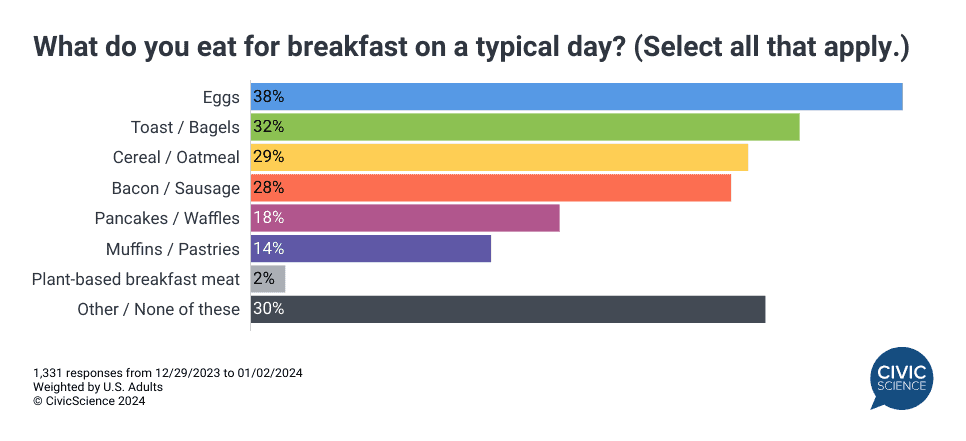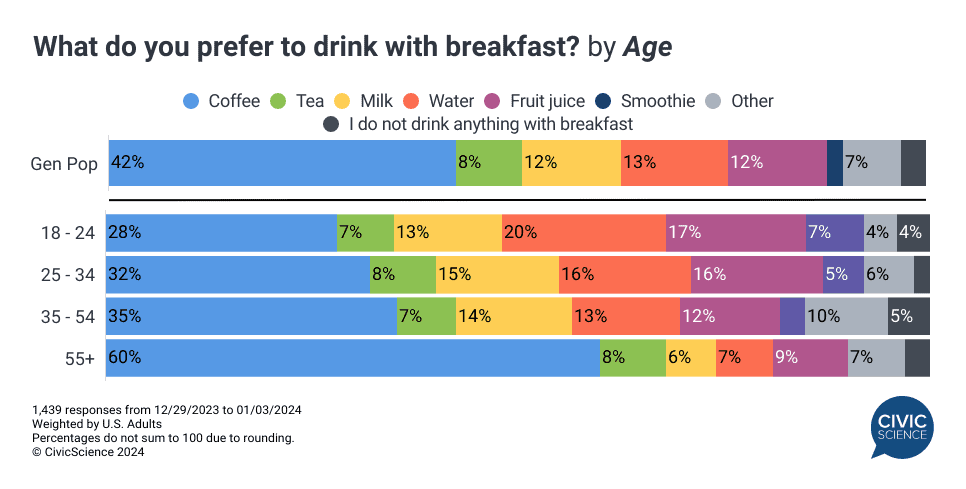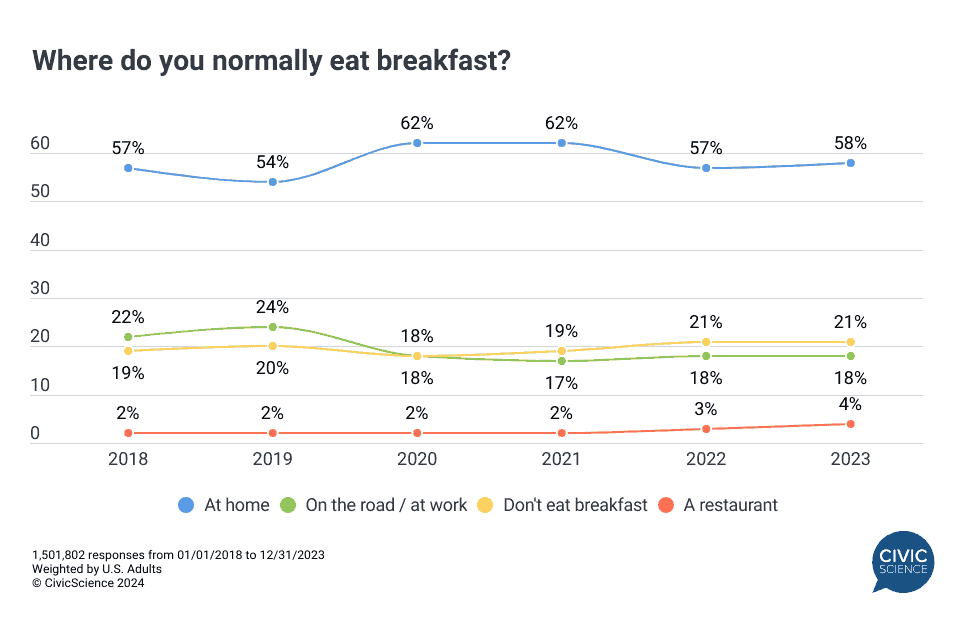Everyone eats, but what they eat – and when – is far from the same. Especially when it comes to breakfast, there’s no one way to start the day. And given the high cost of eggs, as well as recent recalls on popular breakfast foods – 15% of U.S. adults say they have been affected by an FDA recall in the past six months – how will breakfast trends fare in 2024? Current CivicScience data offer insight on what to expect.
Breakfast Fare – Eggs Lead, Coffee Loses Favor
What are Americans putting on their plates for breakfast this year? Eggs continue to top the list, as 38% of consumers say they eat eggs for breakfast on a typical day. That’s followed by staples like toast or bagels (32%) and cereal or oatmeal (29%), which outrank traditional breakfast meats (28%) – differing from how consumers ranked their preferred breakfast foods in 2022. So while eggs still reign on the breakfast table, more affordable options are also vying for the spotlight.

Take Our Poll: Best hot breakfast cereal to eat in colder weather? 🥣
In terms of beverages, coffee is still the most popular breakfast drink, with 42% preferring it over all other options. However, that’s down two percentage points since the start of 2022, when coffee was first seen to decline in popularity as a breakfast staple. Coffee alternatives are clearly preferred among younger adults. Gen Z is the least interested in coffee, and is the most likely age group to drink water, fruit juice, or a smoothie instead.
Additionally, milk increased by three percentage points to 12% this year. Even water has become marginally more popular (up one percentage point) as a breakfast beverage.

Breakfast Today Vs. Breakfast Pre-Pandemic
Yearly data show that 58% of U.S. adults normally eat breakfast at home, while 18% eat on the road or at work. However, in 2019, before the global pandemic changed daily routines in a major way, 54% of consumers were eating at home and 24% were eating on the road or at work.
The shift toward home that Americans have been navigating for almost four years has clearly impacted the breakfast table, evidenced by the peak of 62% who were eating breakfast at home during the key lockdown and social distancing years of 2020 and 2021.

Eating at restaurants increased YoY, with fast-food breakfast remaining popular throughout 2023 and into 2024. Data for the month of December show that 27% of U.S. adults have eaten at a fast-food restaurant for breakfast in the last 30 days. People commuting to in-person jobs are generally more likely to eat fast-food for breakfast (30%) than fully remote workers (27%).
Major Breakfast Obstacles
Of course, there are countless factors that impact a breakfast routine and make it more or less of a challenge. Case in point: CivicScience data show those who typically eat breakfast at home or on the road cite ‘making something quickly’ as their biggest challenge, while those who are the most likely to eat breakfast at a restaurant say it’s ‘making something that cleans up easily.’ Consumers who don’t eat breakfast are more likely to say their biggest challenge is sticking to a budget.
Price also continues to be a hot topic entering the new year; 55% of U.S. adults say they have become ‘more price sensitive’ in the last 12 months (the average for Q4-2023), undoubtedly impacting consumer breakfast trends. Interestingly, those who normally eat breakfast at home are the most likely to say their price sensitivity has stayed ‘about the same’ over the last year, while those eating breakfast on the road or at work are the most likely to feel ‘less price sensitive.’
Breakfast and Health
Currently, 75% of U.S. adults say they believe that eating breakfast is an important part of staying healthy, a sentiment which has remained the same since 2022. And new data suggest the way people eat breakfast correlates with their overall health and wellness – even though people who eat breakfast on the road or at work are just as likely as home breakfast eaters to exercise in the morning, they’re also much more likely to report higher levels of stress.
So, while breakfast continues to be eaten with gusto and the vast majority of Americans believe in a connection between breakfast and good health, the landscape of the breakfast table is changing. More Americans continue to eat breakfast at home than before the pandemic. They’re also drinking less coffee and increasing their consumption of affordable breakfast foods. All of these signs point to changing priorities for 2024.
Join the Conversation: Breakfast: skip it or can’t function without it? 🥓🍳☕
Ready for more forward-looking consumer insights like these in 2024? Learn how CivicScience’s range of solutions can help your brand stay ahead of the curve – get in touch.








